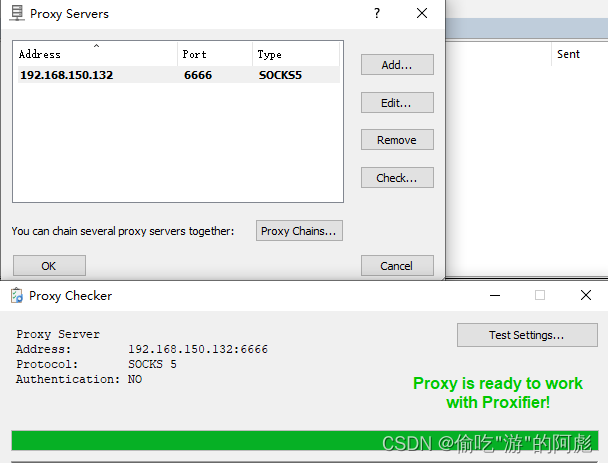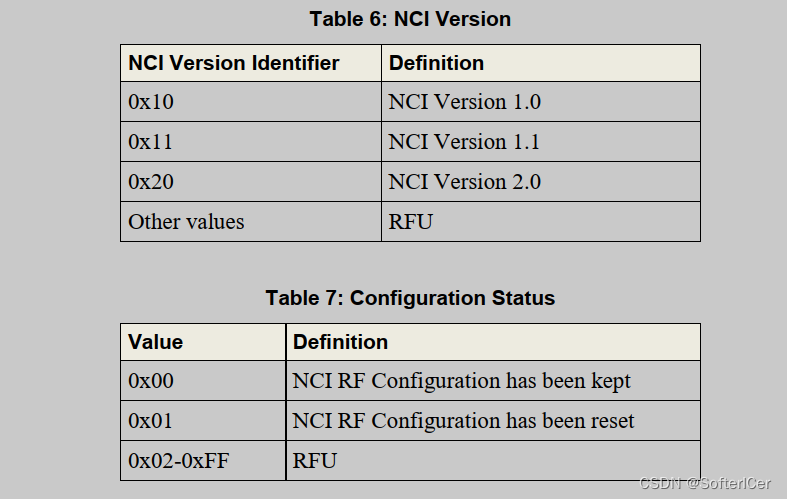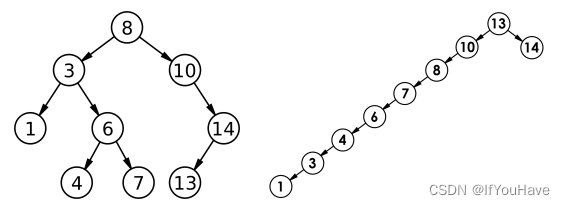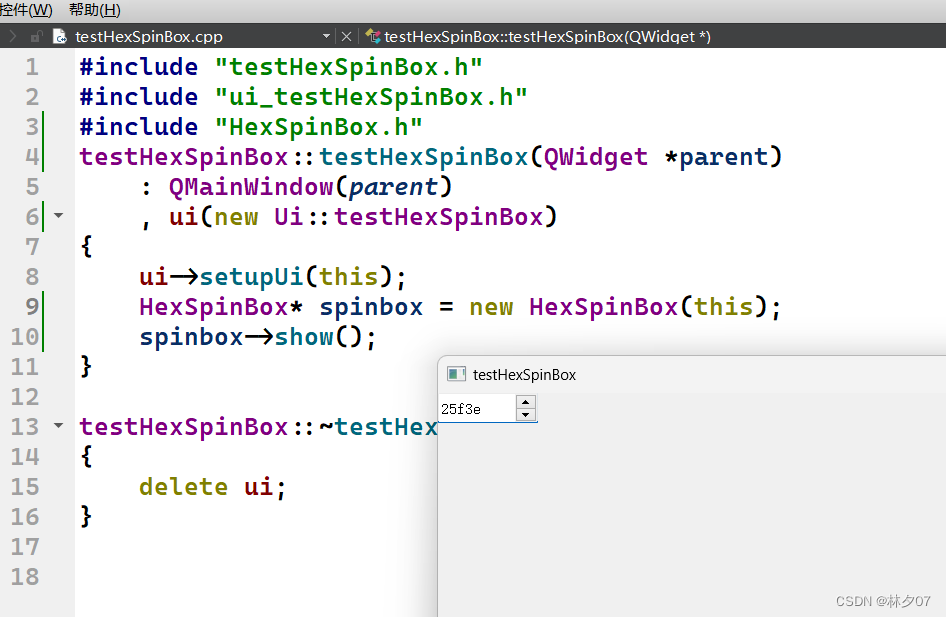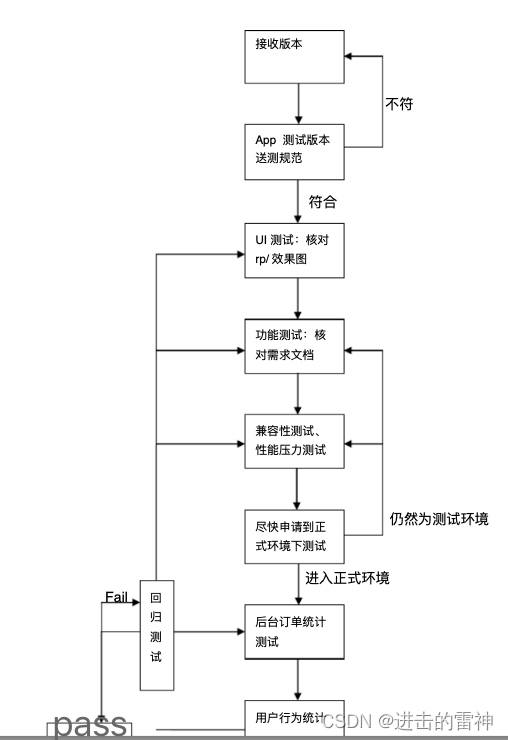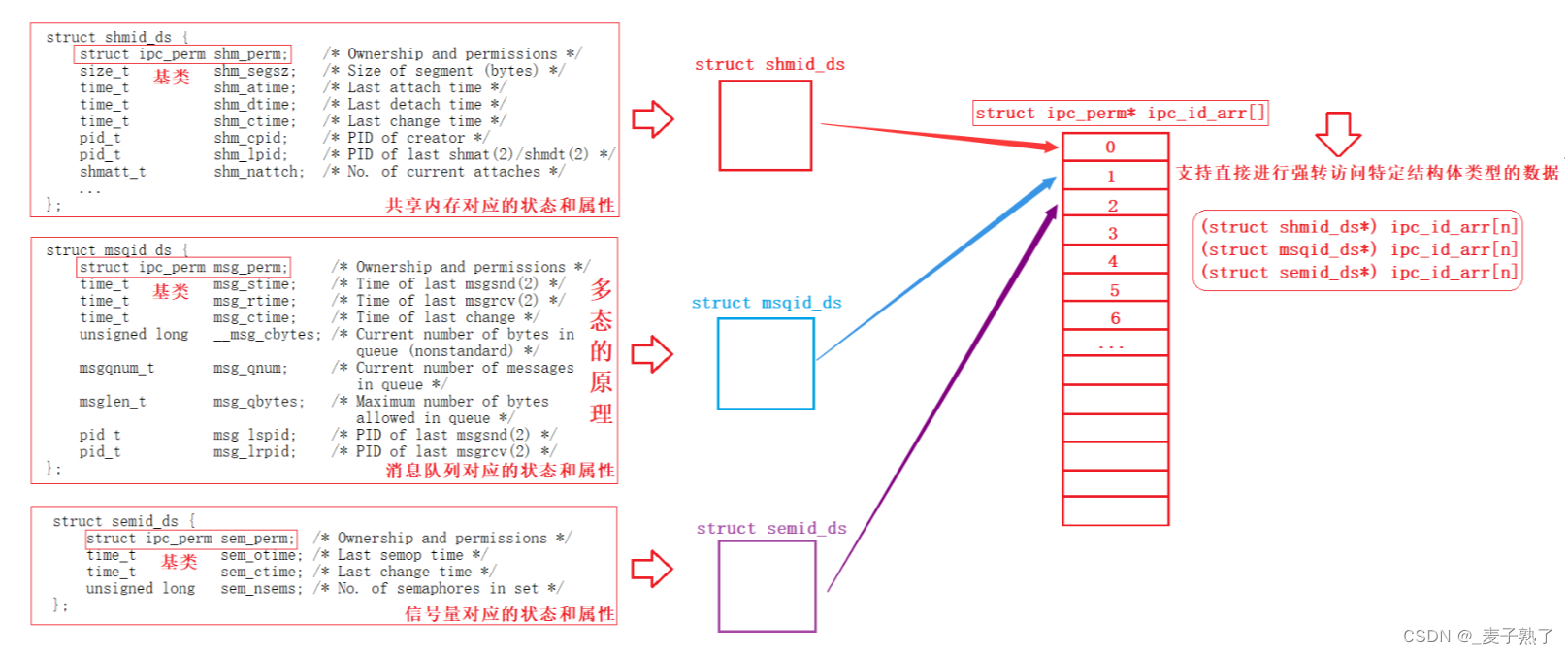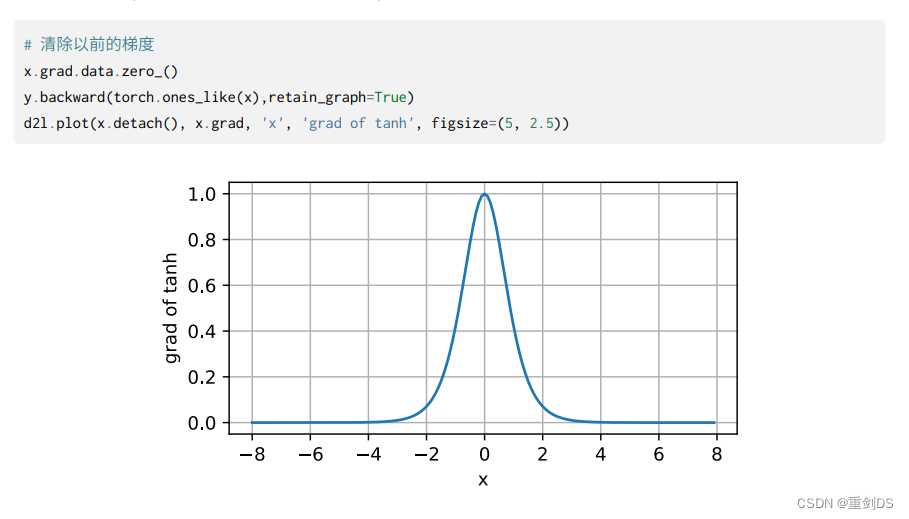FFmpeg 默认是可以解码 AAC 格式的音频,但是如果需要获取 PCM16 此类数据则需要经过音频转码。首先要打开解码器,然后向解码器发送 AAC 音频帧(不带 ADTS),然后从解码器获取解码后的音频帧,数据是 float 类型的,如果需要则进行转码流程将 float 转成整型。
一、AAC 音频
AAC 是高级音频编码(Advanced Audio Coding)的缩写,出现于 1997 年,最初是基于 MPEG-2 的音频编码技术。由Fraunhofer IIS、Dolby Laboratories、AT&T、Sony 等公司共同开发,目的是取代 MP3 格式。2000 年,MPEG-4 标准出台,AAC 重新集成了其它技术(PS、SBR),为区别于传统的 MPEG-2 AAC,故含有 SBR 或 PS 特性的 AAC 又称为 MPEG-4 AAC。
AAC 是新一代的音频有损压缩技术,它通过一些附加的编码技术(比如 PS、SBR 等),衍生出了LC-AAC、HE-AAC、HE-AACv2 三种主要的编码,LC-AAC 就是比较传统的 AAC,相对而言,主要用于中高码率(>=80Kbps),HE-AAC(相当于AAC+SBR)主要用于中低码(<=80Kbps),而新近推出的 HE-AACv2 (相当于AAC+SBR+PS)主要用于低码率(<=48Kbps),事实上大部分编码器设成 <=48Kbps 自动启用 PS 技术,而 >48Kbps 就不加 PS,就相当于普通的 HE-AAC。
1.1 种类
FFmpeg 中一共定义了十种 Profile 格式的 AAC,带 MPEG2 为 MPEG2 支持,其他的为 MPEG4 支持的。
avcodec.h
#define FF_PROFILE_AAC_MAIN 0
#define FF_PROFILE_AAC_LOW 1
#define FF_PROFILE_AAC_SSR 2
#define FF_PROFILE_AAC_LTP 3
#define FF_PROFILE_AAC_HE 4
#define FF_PROFILE_AAC_HE_V2 28
#define FF_PROFILE_AAC_LD 22
#define FF_PROFILE_AAC_ELD 38
#define FF_PROFILE_MPEG2_AAC_LOW 128
#define FF_PROFILE_MPEG2_AAC_HE 131MAIN 代表主规格
LOW 低复杂度规格(Low Complexity)
SSR 可变采样率规格(Scaleable Sample Rate)
LTP 长时期预测规格(Long Term Predicition)
HE 高效率规格(High Efficiency)AAC+
HE_V2 高效率 V2 规格(High Efficiency V2)Enhanced AAC+
LD 低延迟规格(Low Delay)
ELD 增强低延迟规格(Enhanced low Low Delay)
1.2 格式
查看《ISO/IEC 13818-7》可进一步了解 AAC 音频的详细格式。AAC 的音频文件格式有 ADIF 和 ADTS。
ADIF:Audio Data Interchange Format
音频数据交换格式。这种格式的特征是可以确定的找到这个音频数据的开始,不需进行在音频数据流中间开始的解码,即它的解码必须在明确定义的开始处进行。故这种格式常用在磁盘文件中。
音频数据交换格式序列包括 ADIF 头,字节对齐和实际数据。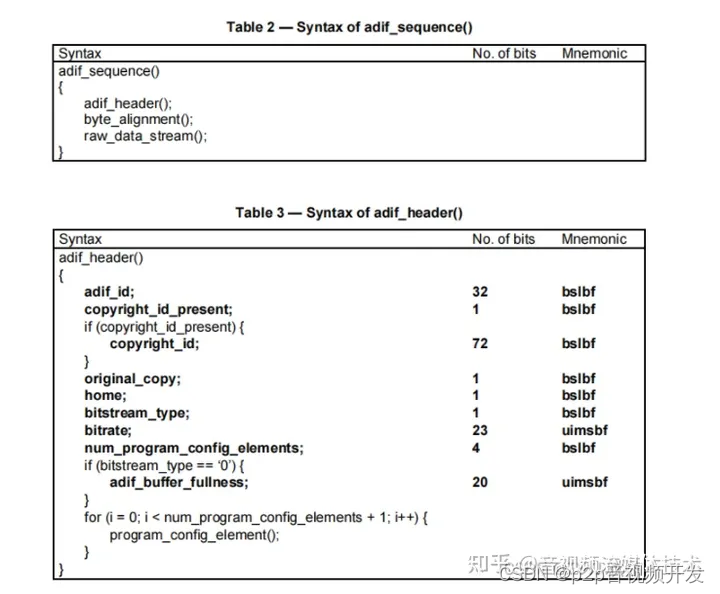
adif_id 表示音频数据交换格式的 ID。它的值是 0x41444946 (最高位在前),这是字符串“ADIF”的 ASCII 表示形式。
copyright_id_present 指示copyright_id是否存在。
copyright_id 该字段由一个8位的 copyright_identifier 和一个64位的 copyright_number 组成。
original_copy 参见 ISO/IEC 11172-3 第 2.4.2.3 款对版权的定义。
home 参见 ISO/IEC 11172-3,第 2.4.2.3 小节对 original_copy 的定义。
bitstream_type 指明位流类型的标志:
“0”恒速率比特流;
“1”可变速率比特流。
bitrate 一个23位无符号整数,指示在恒定速率的比特流中比特流的比特率,或在可变速率的比特流中最大峰值比特率(每帧测量)。0表示不知道比特率。
num_program_config_element program_config_element() 的数量。
adif_buffer_fullness 在 adif_sequence() 中对第一个 raw_data_block() 进行编码后 bit reservoir 的状态。
ADTS:Audio Data Transport Stream
音频数据传输流。这种格式的特征是它是一个有同步字的比特流,解码可以在这个流中任何位置开始。它的特征类似于 mp3 数据流格式。
一般情况下 ADTS 的头信息都是 7 个字节,分为 2 部分:
adts_fixed_header() —— 固定部
adts_variable_header() —— 可变部分

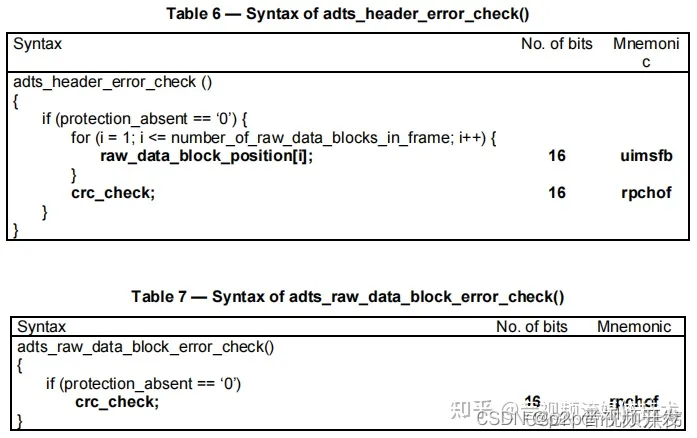
syncword 同步头,总是 0xFFF,代表着一个 ADTS 帧的开始。
ID MPEG 版本:0 代表 MPEG-4,1 代表 MPEG-2。
layer 总是 ‘00’。
profile 表示使用哪个级别的 AAC。
sampling_frequency_index 表示使用的采样率下标,通过这个下标在 Sampling Frequencies[] 数组中查找得知采样率的值。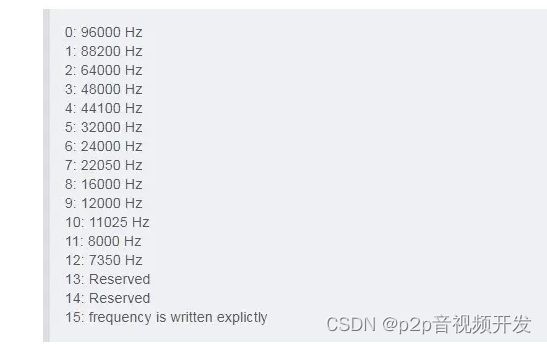
channel_configuration表示声道数。
frame_length 一个 ADTS 帧的长度包括 ADTS 头和 AAC 原始流。
adts_buffer_fullness ADTS 帧编码过程中 bit reservoir 的状态 ,0x7FF 说明是码率可变的码流。
protection_absent 指示是否存在 error_check() 数据。
private_bit 参见 ISO/IEC 11172-3,第 2.4.2.3 条。
copyright_identification_bit 表示 72 位版权标识字段。
copyright_identification_start 表示 copyright_identification_bit
音频帧是 72 位版权标识的第一个位。如果没有版权标识被传送,这个位应该被保留 “0”。
number_of_raw_data_blocks_in_frame 被复用的 raw_data_block() 的数目。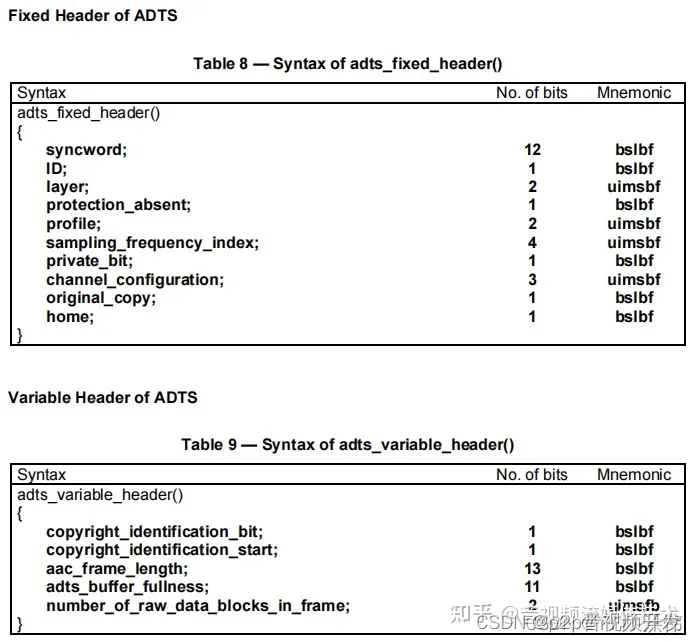
二、AAC 音频解码
1.获取 AAC 解码器 Codec,调用 avcodec_find_decoder(AV_CODEC_ID_AAC) 获取;
2.调用 avcodec_alloc_context3(…) 分配 AVCodecContext 结构,它是解码器 Codec 上下文;
3.调用 avcodec_parameters_alloc() 分配 AVCodecParameters 结构,可用来给解码器设置必要参数;
4.将必要解码参数设置到 AVCodecParameters,采样率、声道数、解码后的格式(此处需要注意,实际上 AAC 解码器默认解码后的格式都是 AV_SAMPLE_FMT_FLTP)等;
5.接下来调用 avcodec_parameters_to_context(…) 将 AVCodecParameters 结构中的参数复制到 AVCodecContext,AVCodecParameters 结构完成使命调用 avcodec_parameters_free(…) 释放其内存;
6.现在可以调用 avcodec_open2(…) 打开解码器。
接下来就可以从 PacketQueue 队列(存放 AAC 编码的帧队列,不需要带 ADTS 头,因为解码器中的必要信息已经设置)源源不断获取 AAC 编码后的音频帧送入解码器进行解码。将编码帧送到解码器是调用 avcodec_send_packet(…) 实现的,然后就可以调用 avcodec_receive_frame(…) 获取解码帧。
由于有些平台并不支持 AV_SAMPLE_FMT_FLTP 格式的 PCM 直接播放,所以需要将 float PCM 转成 AV_SAMPLE_FMT_S16。
转码流程
1.调用 swr_alloc() 分配 SwrContext 转码上下文结构;
2.调用 swr_alloc_set_opts(…) 给转码上下文结构设置必要参数;
3.调用 swr_init(…) 初始化 SwrContext 转码上下文结构;
4.重复调用 swr_convert(…) 进行转码。
最后,不在使用的 SwrContext 结构、AVFrame 、AVCodecContext 全部都要调用其释放函数进行收尾工作。
FFmpeg 解码 AAC 格式音频代码
将 AAC 解码封装到 AudioDecoder 类中。
//
// Created by liuhongwei on 2021/12/7.
//
#ifndef AUDIODECODER_H
#define AUDIODECODER_H
extern "C" {
//编解码
#include "libavcodec/avcodec.h"
#include <libswresample/swresample.h>
}
#include "PacketQueue.h"
#include "cb/FrameDataCallback.h"
class AudioDecoder {
public:
AudioDecoder(PacketQueue *packetQueue);
~AudioDecoder();
bool open(unsigned int sampleFreq, unsigned int channels, unsigned int profile = 1);
void close();
void decode();
static void *_decode(void *self) {
static_cast<AudioDecoder *>(self)->decode();
return nullptr;
}
void setFrameDataCallback(FrameDataCallback *frameDataCallback);
private:
PacketQueue *pPacketQueue;
AVCodecContext *pAudioAVCodecCtx;
AVFrame *pFrame;
unsigned int gSampleFreq;
bool volatile isDecoding;
pthread_t decodeThread;
pthread_mutex_t *pFrameDataCallbackMutex;
FrameDataCallback *pFrameDataCallback;
SwrContext *pSwrContext;
uint8_t *pPCM16OutBuf;
};
#endif //AUDIODECODER_H具体实现
//
// Created by liuhongwei on 2021/12/7.
//
#include <unistd.h>
#include "AudioDecoder.h"
AudioDecoder::AudioDecoder(PacketQueue *packetQueue) {
pPacketQueue = packetQueue;
pFrameDataCallbackMutex = (pthread_mutex_t *) malloc(sizeof(pthread_mutex_t));
int ret = pthread_mutex_init(pFrameDataCallbackMutex, nullptr);
if (ret != 0) {
LOGE("audio FrameDataCallbackMutex init failed.\n");
}
pFrameDataCallback = nullptr;
pSwrContext = nullptr;
pPCM16OutBuf = nullptr;
}
AudioDecoder::~AudioDecoder() {
pthread_mutex_destroy(pFrameDataCallbackMutex);
if (nullptr != pFrameDataCallbackMutex) {
free(pFrameDataCallbackMutex);
pFrameDataCallbackMutex = nullptr;
}
}
bool AudioDecoder::open(unsigned int sampleFreq, unsigned int channels, unsigned int profile) {
gSampleFreq = sampleFreq;
int ret;
AVCodec *dec = avcodec_find_decoder(AV_CODEC_ID_AAC);
LOGI("%s audio decoder name: %s", __FUNCTION__, dec->name);
enum AVSampleFormat sample_fmt = AV_SAMPLE_FMT_FLTP;//注意:设置为其他值并不生效
int bytesPerSample = av_get_bytes_per_sample(sample_fmt);
pAudioAVCodecCtx = avcodec_alloc_context3(dec);
if (pAudioAVCodecCtx == nullptr) {
LOGE("%s AudioAVCodecCtx alloc failed", __FUNCTION__);
return false;
}
AVCodecParameters *par = avcodec_parameters_alloc();
if (par == nullptr) {
LOGE("%s audio AVCodecParameters alloc failed", __FUNCTION__);
avcodec_free_context(&pAudioAVCodecCtx);
return false;
}
par->codec_type = AVMEDIA_TYPE_AUDIO;
par->sample_rate = (int) sampleFreq;
par->channel_layout = av_get_default_channel_layout((int) channels);
par->channels = (int) channels;
par->bit_rate = sampleFreq * channels * bytesPerSample;
par->format = sample_fmt;
par->profile = (int) profile;
avcodec_parameters_to_context(pAudioAVCodecCtx, par);
avcodec_parameters_free(&par);
LOGI("%s sample_rate=%d channels=%d bytesPerSample=%d", __FUNCTION__, sampleFreq, channels,
bytesPerSample);
ret = avcodec_open2(pAudioAVCodecCtx, dec, nullptr);
if (ret < 0) {
LOGE("%s Can not open audio encoder", __FUNCTION__);
avcodec_free_context(&pAudioAVCodecCtx);
return false;
}
LOGI("%s avcodec_open2 audio SUCC", __FUNCTION__);
pFrame = av_frame_alloc();
if (pFrame == nullptr) {
LOGE("%s audio av_frame_alloc failed", __FUNCTION__);
avcodec_free_context(&pAudioAVCodecCtx);
return false;
}
pSwrContext = swr_alloc();
if (pSwrContext == nullptr) {
LOGE("%s swr_alloc failed", __FUNCTION__);
avcodec_free_context(&pAudioAVCodecCtx);
av_frame_free(&pFrame);
return false;
}
swr_alloc_set_opts(
pSwrContext,
pAudioAVCodecCtx->channel_layout,
AV_SAMPLE_FMT_S16,
pAudioAVCodecCtx->sample_rate,
pAudioAVCodecCtx->channel_layout,
pAudioAVCodecCtx->sample_fmt,
pAudioAVCodecCtx->sample_rate,
0, nullptr
);
ret = swr_init(pSwrContext);
if (ret != 0) {
LOGE("%s swr_init failed", __FUNCTION__);
avcodec_free_context(&pAudioAVCodecCtx);
av_frame_free(&pFrame);
swr_free(&pSwrContext);
return false;
}
pPCM16OutBuf = (uint8_t *) malloc(
av_get_bytes_per_sample(AV_SAMPLE_FMT_S16) * 1024);
if (pPCM16OutBuf == nullptr) {
LOGE("%s PCM16OutBufs malloc failed", __FUNCTION__);
avcodec_free_context(&pAudioAVCodecCtx);
av_frame_free(&pFrame);
swr_free(&pSwrContext);
return false;
}
isDecoding = true;
ret = pthread_create(&decodeThread, nullptr, &AudioDecoder::_decode, (void *) this);
if (ret != 0) {
LOGE("audio decode-thread create failed.\n");
isDecoding = false;
avcodec_free_context(&pAudioAVCodecCtx);
av_frame_free(&pFrame);
swr_free(&pSwrContext);
free(pPCM16OutBuf);
pPCM16OutBuf = nullptr;
return false;
}
return true;
}
void AudioDecoder::close() {
isDecoding = false;
pthread_join(decodeThread, nullptr);
if (pPCM16OutBuf != nullptr) {
free(pPCM16OutBuf);
pPCM16OutBuf = nullptr;
LOGI("%s PCM16OutBuf free", __FUNCTION__);
}
if (pSwrContext != nullptr) {
swr_free(&pSwrContext);
LOGI("%s SwrContext free", __FUNCTION__);
}
if (pFrame != nullptr) {
av_frame_free(&pFrame);
LOGI("%s audio Frame free", __FUNCTION__);
}
if (pAudioAVCodecCtx != nullptr) {
avcodec_free_context(&pAudioAVCodecCtx);
LOGI("%s audio avcodec_free_context", __FUNCTION__);
}
}
void AudioDecoder::setFrameDataCallback(FrameDataCallback *frameDataCallback) {
pthread_mutex_lock(pFrameDataCallbackMutex);
pFrameDataCallback = frameDataCallback;
pthread_mutex_unlock(pFrameDataCallbackMutex);
}
void AudioDecoder::decode() {
int ret;
unsigned sleepDelta = 1024 * 1000000 / gSampleFreq / 4;// 一帧音频的 1/4
while (isDecoding) {
if (pPacketQueue == nullptr) {
usleep(sleepDelta);
continue;
}
AVPacket *pkt = av_packet_alloc();
if (pkt == nullptr) {
usleep(sleepDelta);
continue;
}
PACKET_STRUCT *packetStruct;
bool isDone = pPacketQueue->Take(packetStruct);
if (isDone && packetStruct != nullptr && packetStruct->data != nullptr &&
packetStruct->data_size > 0) {
ret = av_new_packet(pkt, packetStruct->data_size);
if (ret < 0) {
av_packet_free(&pkt);
free(packetStruct->data);
free(packetStruct);
continue;
}
} else {
av_packet_free(&pkt);
usleep(sleepDelta);
continue;
}
memcpy(pkt->data, packetStruct->data, packetStruct->data_size);
pkt->pts = packetStruct->timestamp;
pkt->dts = packetStruct->timestamp;
/* send the packet for decoding */
ret = avcodec_send_packet(pAudioAVCodecCtx, pkt);
//LOGD("%s send the audio packet for decoding pkt size=%d", __FUNCTION__, pkt->size);
free(packetStruct->data);
free(packetStruct);
av_packet_unref(pkt);
av_packet_free(&pkt);
if (ret < 0) {
LOGE("%s Error sending the audio pkt to the decoder ret=%d", __FUNCTION__, ret);
usleep(sleepDelta);
continue;
} else {
// 编码和解码都是一样的,都是send 1次,然后receive多次, 直到AVERROR(EAGAIN)或者AVERROR_EOF
while (ret >= 0) {
ret = avcodec_receive_frame(pAudioAVCodecCtx, pFrame);
if (ret == AVERROR(EAGAIN) || ret == AVERROR_EOF) {
usleep(sleepDelta);
continue;
} else if (ret < 0) {
LOGE("%s Error receive decoding audio frame ret=%d", __FUNCTION__, ret);
usleep(sleepDelta);
continue;
}
// 解码固定为 AV_SAMPLE_FMT_FLTP,需要转码为 AV_SAMPLE_FMT_S16
// 数据都装在 data[0] 中,而大小则为 linesize[0](实际发现此处大小并不对,大小计算见下面)
int planeNum = 1;
int dataLen[planeNum];
/*dataLen[0] = pFrame->nb_samples *
av_get_bytes_per_sample((enum AVSampleFormat) (pFrame->format));*/
// 重采样转为 S16
uint8_t *pcmOut[1] = {nullptr};
pcmOut[0] = pPCM16OutBuf;
// 音频重采样
int number = swr_convert(
pSwrContext,
pcmOut,
pFrame->nb_samples,
(const uint8_t **) pFrame->data,
pFrame->nb_samples
);
if (number != pFrame->nb_samples) {
LOGE("%s swr_convert appear problem number=%d", __FUNCTION__, number);
} else {
dataLen[0] = pFrame->nb_samples *
av_get_bytes_per_sample(AV_SAMPLE_FMT_S16);
pthread_mutex_lock(pFrameDataCallbackMutex);
if (pFrameDataCallback != nullptr) {
//LOGD("%s receive the decode frame size=%d nb_samples=%d", __FUNCTION__, dataLen[0], pFrame->nb_samples);
pFrameDataCallback->onDataArrived(StreamType::AUDIO,
(long long) pFrame->pts,
(char **) pcmOut,
dataLen,
planeNum,
pAudioAVCodecCtx->channels,
pAudioAVCodecCtx->sample_rate,
-1,
-1);
}
pthread_mutex_unlock(pFrameDataCallbackMutex);
}
av_frame_unref(pFrame);
}
}
}
}

